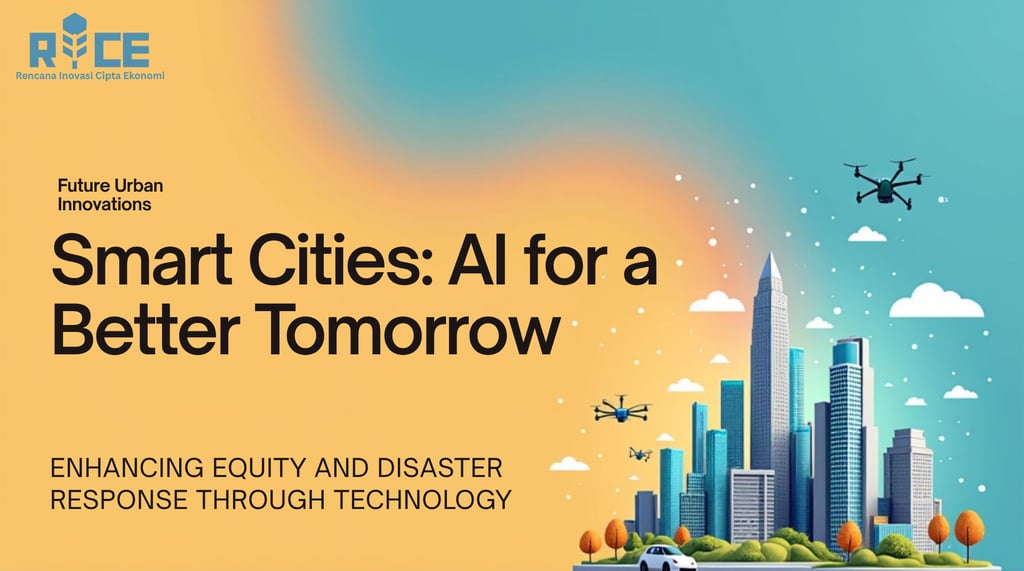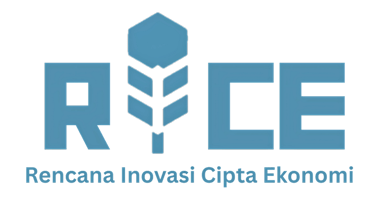Smart Cities of Tomorrow: AI for Equitable Urban Planning and Disaster Response
AI is shaping smarter, equitable cities through advanced planning and disaster response. It seems likely that AI improves resource allocation and early warnings, but challenges like privacy and bias exist.
AI INSIGHT
Rice AI (Ratna)
6/12/20258 min baca


Introduction: Envisioning the Smart Cities of Tomorrow
As urban populations swell and climate-driven disasters intensify, cities face unprecedented challenges in ensuring equitable access to resources and robust disaster preparedness. In 2021, the world witnessed 432 catastrophic natural disasters, surpassing the annual average of 357 from 2001 to 2020, resulting in over 10,000 deaths, impacting 101.8 million people, and causing $252.1 billion in economic losses (PMC, 2023). Artificial Intelligence (AI) is emerging as a transformative force in addressing these challenges, powering smart cities to optimize urban planning and enhance disaster response. By leveraging AI, cities can predict growth patterns, allocate resources equitably, and respond swiftly to crises, fostering resilient and inclusive communities. However, challenges such as data privacy, algorithmic bias, and digital divides must be navigated to ensure fairness.
This article explores how AI is shaping equitable urban planning and disaster response, aligning with Rice AI Consultant’s mission to build resilient communities through human-AI teaming and ethical AI solutions, as outlined on their website (riceai.net). Targeted at readers interested in AI, data analytics, and digital transformation, this comprehensive analysis draws from trusted sources, including academic journals, industry reports, and reputable news outlets, to provide deep insights into the potential and pitfalls of AI in smart cities. We will examine real-world applications, ethical considerations, and future implications, offering a balanced perspective on how AI can create smarter, more inclusive urban futures.
The Rise of Smart Cities and AI’s Pivotal Role
Smart cities integrate information and communication technologies (ICT), including AI, Internet of Things (IoT), and big data, to enhance urban services, sustainability, and resilience. According to a 2023 survey by 451 Research, public safety (50%), quality of life (44%), and city services (42%) are key drivers for smart city adoption (S&P Global, 2024). AI serves as the backbone of these initiatives, processing vast datasets to uncover patterns, make predictions, and enable data-driven decisions. From optimizing traffic flow to predicting disaster risks, AI’s capabilities are reshaping urban landscapes.
Rice AI Consultant, as highlighted on riceai.net, specializes in advanced analytics, machine learning models, and AI-driven solutions that align with these goals. Their focus on human-AI teaming ensures that AI complements human expertise, particularly in emergency management, while their commitment to ethical AI addresses fairness and transparency in urban applications. This alignment positions Rice AI Consultant as a leader in supporting smart cities to achieve equitable and resilient outcomes.
AI in Equitable Urban Planning: Building Inclusive Cities
Urban planning is the cornerstone of sustainable development, ensuring cities meet the needs of growing populations while addressing economic, social, and environmental challenges. AI transforms this process by analyzing historical and real-time data to predict urban growth, identify congestion points, and optimize land use. A 2023 systematic review in Sustainable Cities and Society emphasizes that AI, combined with big data, enables planners to address these challenges holistically, from economic disparities to environmental sustainability (ScienceDirect, 2023).
Enhancing Resource Allocation
AI promotes equitable urban planning by identifying underserved areas and guiding resource allocation. For instance, AI-driven models can analyze demographic and socioeconomic data to ensure equitable distribution of schools, hospitals, and public spaces. In London, AI-powered systems provide hyperlocal air quality data, enabling targeted environmental interventions that benefit marginalized communities disproportionately affected by pollution (S&P Global, 2024). Such applications ensure that resources are allocated based on need, reducing disparities in access to essential services.
Addressing Urban Challenges
AI also tackles urban challenges like traffic congestion and housing shortages. Machine learning models predict traffic patterns, enabling cities like Singapore to optimize public transport routes, reducing commute times for residents (S&P Global, 2024). Similarly, AI-driven urban simulations help planners design affordable housing projects by forecasting demand and identifying optimal locations. These efforts align with Rice AI Consultant’s expertise in advanced analytics, which can model complex urban systems to support equitable development.
Mitigating Bias for Fairness
However, AI’s potential for equitable planning hinges on addressing algorithmic bias. If trained on biased data, AI systems can perpetuate inequalities, such as prioritizing affluent areas for infrastructure upgrades. To counter this, diverse datasets, transparent algorithms, and inclusive stakeholder engagement are essential (S&P Global, 2024). Rice AI Consultant’s emphasis on ethical AI, as noted on riceai.net, ensures that their solutions prioritize fairness, incorporating bias mitigation strategies to create inclusive urban environments.
AI in Disaster Response: Strengthening Resilience
Disasters, from hurricanes to earthquakes, pose significant threats to urban populations. AI enhances disaster management across three phases: preparedness, response, and recovery, enabling cities to mitigate risks and protect residents effectively.
Preparedness: Early Warning Systems
AI-powered early warning systems leverage real-time data to predict disasters with unprecedented accuracy. For example, SeismicAI in Mexico uses machine learning to detect earthquakes in real time, providing critical seconds for evacuation (TIME, 2024). Similarly, Atmo’s AI-driven weather models, with resolutions finer than one square mile, offer precise forecasts for storms and floods, enabling proactive measures (TIME, 2024). These systems align with Rice AI Consultant’s machine learning expertise, which can enhance predictive models for disaster preparedness.
Response: Real-Time Coordination
During disasters, AI facilitates rapid response by analyzing satellite imagery, social media, and sensor data to assess damage and prioritize aid. Post-Hurricane Ian, GiveDirectly used AI to analyze satellite images, identifying affected households for targeted relief within hours (TIME, 2024). AI also streamlines communication, reducing hurricane warning translation times from 60 to 10 minutes, ensuring timely alerts for diverse populations (TIME, 2024). Rice AI Consultant’s human-AI teaming approach enhances these efforts, combining AI’s data processing with human judgment to ensure effective and equitable aid distribution.
Recovery: Rebuilding Smarter
In the recovery phase, AI supports damage assessment and rebuilding efforts. Digital twins—virtual city models—enable planners to simulate disaster impacts and design resilient infrastructure. Lisbon’s digital twin, for instance, models flood risks to inform recovery strategies (S&P Global, 2024). AI also addresses mental health needs, as the World Health Organization estimates that 20% of disaster-affected individuals experience mental disorders, with PTSD rates as high as 74% in severe cases (PMC, 2023). AI-driven chatbots and telehealth platforms can provide scalable mental health support, aligning with Rice AI Consultant’s focus on innovative AI solutions.
Case Studies: AI in Action
Real-world applications illustrate AI’s transformative impact on smart cities:
New York City: After Hurricane Sandy, AI analyzed response data to identify gaps in emergency plans, leading to improved preparedness for future storms (Urban SDK, 2024). This data-driven approach mirrors Rice AI Consultant’s analytics capabilities, which can enhance urban resilience.
Las Vegas: Smart parks equipped with optical sensors and AI analytics improve public safety by detecting anomalies in real time, ensuring safer public spaces (S&P Global, 2024).
Tokyo: AI-powered earthquake and tsunami warning systems provide rapid alerts, saving lives through timely evacuations (ACM Digital Library, 2024).
Barcelona: As part of the UN’s Global Initiative on Resilience, Barcelona tests AI-driven disaster management tools, integrating predictive analytics with community engagement (TIME, 2024).
Urban SDK’s work in Florida exemplifies AI’s role in disaster response. During Hurricanes Helene and Milton, which triggered the state’s largest evacuation, Urban SDK’s AI platform provided live impact detection and streaming data, enabling rapid response coordination (Urban SDK, 2024). Trusted by over 200 agencies, their platform resolves citizen complaints within five minutes, demonstrating AI’s efficiency in crisis management.
Rice AI Consultant’s Role in Shaping Smart Cities
Rice AI Consultant, as detailed on riceai.net, is at the forefront of AI-driven urban transformation. Their core capabilities include:
Advanced Analytics: Developing predictive models to optimize urban planning and disaster preparedness.
Machine Learning Models: Powering real-time data analysis for applications like traffic management and early warning systems.
AI-Driven Solutions: Creating scalable tools for urban challenges, from resource allocation to emergency response.
Human-AI Teaming: Ensuring AI complements human expertise, particularly in high-stakes scenarios like disaster management.
Ethical AI: Prioritizing fairness, transparency, and bias mitigation to create inclusive urban systems.
These capabilities align seamlessly with the needs of smart cities, enabling equitable planning and resilient disaster response. For instance, Rice AI’s analytics can enhance urban simulations for equitable resource distribution, while their human-AI teaming ensures ethical decision-making in emergency scenarios. By integrating these strengths, Rice AI Consultant supports cities in building sustainable, inclusive futures.
Challenges and Ethical Considerations
Despite its promise, AI in smart cities faces significant challenges that must be addressed to ensure equitable outcomes.
Data Privacy and Security
Smart cities rely on extensive sensor networks and data collection, raising concerns about privacy and security. A 2024 S&P Global report highlights the risk of cyberattacks on interconnected systems, which could disrupt critical services (S&P Global, 2024). Robust encryption and data governance frameworks are essential to protect residents’ information.
Digital Divide
The digital divide risks excluding marginalized communities from smart city benefits. If AI systems prioritize areas with better data infrastructure, underserved regions may be overlooked. Inclusive data collection and community engagement are critical to bridge this gap (S&P Global, 2024).
Algorithmic Bias
AI systems trained on biased data can perpetuate inequalities. For example, predictive policing models may unfairly target minority communities if historical crime data reflects systemic biases (S&P Global, 2024). Rice AI Consultant’s ethical AI approach, emphasizing diverse datasets and transparency, is crucial for mitigating these risks.
Accountability
Determining accountability for AI-driven decisions remains a challenge. If an AI system misallocates resources or fails to predict a disaster, who is responsible? Clear governance structures and human oversight, as advocated by Rice AI Consultant, are essential to ensure accountability.
Future Implications: The Trajectory of AI in Smart Cities
Over the next 5-10 years, AI will deepen its integration into smart cities, driving transformative changes:
Advanced Predictive Analytics: AI will enable more accurate predictions for urban growth and disaster risks, allowing proactive interventions (S&P Global, 2024).
Autonomous Systems: Drones and autonomous vehicles will enhance disaster response, delivering supplies and assessing damage in real time (TIME, 2024).
Citizen Engagement: AI-powered platforms will facilitate participatory planning, empowering residents to shape their cities (ScienceDirect, 2023).
Sustainable Development: AI will optimize energy use and waste management, supporting climate goals (S&P Global, 2024).
Global collaboration will accelerate these advancements, with initiatives like the UN’s Global Initiative on Resilience fostering knowledge sharing. However, ethical governance will be critical to address privacy, equity, and accountability, ensuring AI serves all residents. Rice AI Consultant’s expertise in ethical AI and human-AI teaming positions them to lead in this space, guiding cities toward inclusive and resilient futures.
Conclusion: A Vision for Inclusive, Resilient Cities
AI is revolutionizing smart cities, offering powerful tools for equitable urban planning and disaster response. By predicting growth, optimizing resources, and enhancing crisis management, AI fosters resilient communities that can withstand the challenges of urbanization and climate change. Real-world examples, from London’s air quality mapping to Tokyo’s earthquake warnings, demonstrate AI’s transformative potential. Yet, challenges like privacy, bias, and digital divides require careful navigation through ethical governance and inclusive practices.
Rice AI Consultant’s capabilities in advanced analytics, human-AI teaming, and ethical AI align perfectly with these goals, enabling cities to build smarter, more equitable systems. As of June 12, 2025, the trajectory points to a future where AI, guided by ethical principles, creates urban environments that serve all residents. This vision, subtly reflected in Rice AI Consultant’s mission, underscores the importance of collaboration between technology and humanity to shape inclusive, resilient cities of tomorrow.
References
PMC. (2023). Potential Use of AI in Disaster Risk and Emergency Health Management. https://pmc.ncbi.nlm.nih.gov/articles/PMC10712270/
S&P Global. (2024). The Rise of AI-Powered Smart Cities. https://www.spglobal.com/en/research-insights/special-reports/ai-smart-cities
ScienceDirect. (2023). Algorithmic Urban Planning for Smart Sustainable Development. https://www.sciencedirect.com/science/article/pii/S2210670723001737
TIME. (2024). How AI Is Being Used to Respond to Natural Disasters in Cities. https://time.com/7171445/ai-natural-disaster-cities/
Urban SDK. (2024). AI Disaster Response Solutions for Cities and Governments. https://www.urbansdk.com/resources/ai-real-time-data-transforming-disaster-response-building-smarter-safer-cities
ACM Digital Library. (2024). Applications of Artificial Intelligence in Disaster Management. https://dl.acm.org/doi/fullHtml/10.1145/3669754.3669802
Microspace. (2024). Building Resilient Smart Cities Leveraging Technology. https://microspace.com/building-resilient-smart-cities-leveraging-technology-for-disaster-preparedness/
#SmartCities #AI #UrbanPlanning #DisasterResponse #EthicalAI #ResilientCommunities #Innovation #Sustainability #FutureOfCities #Technology #DailyAIInsight
RICE AI Consultant
Menjadi mitra paling tepercaya dalam transformasi digital dan inovasi AI, yang membantu organisasi untuk bertumbuh secara berkelanjutan dan menciptakan masa depan yang lebih baik.
Hubungi kami
Email: consultant@riceai.net
+62 822-2154-2090 (Marketing)
© 2025. All rights reserved.


+62 851-1748-1134 (Office)
IG: @riceai.consultant
